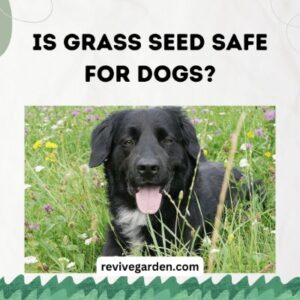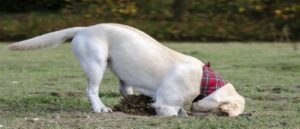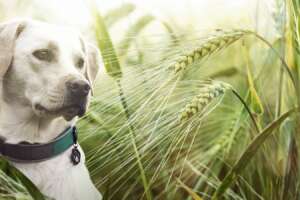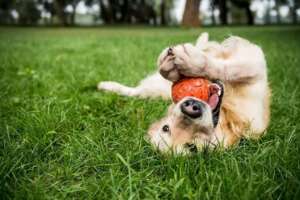Table of Contents

The answer needs to be clarified. The fact is that grass seed can be toxic to dogs, especially if they ingest enough of it.
However, the grass seed needed to harm dogs is quite large. If your dog eats some grass seed, panic is unnecessary. Dogs have been eating grass seeds since they were domesticated and haven’t died yet.
As with any other substance (or food), there are some precautions you should take when giving grass seeds to your pet. Here are some tips on whether or not it’s safe for your dog:
- Grass seed is healthy and nutritious for dogs, but too much can cause diarrhea and an upset stomach.
- Grass seeds can be toxic if ingested in large quantities. You should only give your dog the amount of grass seed that would fit in a tablespoon.
- If you notice any signs of illness in your dog after feeding them grass seed, such as vomiting or diarrhea, contact your vet immediately.
Being a pet owner, seeding a lawn, or dealing with a house with a lawn is challenging. What is even more crucial is the selection of grass the pet owner makes. Dogs may harm themselves through the grass in two ways.

- One way can be due to the penetration of grass seeds in the dogs’ paws of furry bodies.
- Other problems may arise if dogs consume grass seed that may cause harm to their health. If you want to gather information about grass seed, you are on the right page.
This article will help you to know if grass seed is safe for dogs. Moreover, you will identify different types of pet-friendly grass seeds.
Is It Toxic?

Not all grass seeds are toxic. Some types of grass can be toxic or poisonous to humans, but most are not harmful to dogs or cats. However, if you need clarification on the type of grass seed you’ve found, it’s best to check with a veterinarian before feeding it to your pet. Your vet may be able to identify the type of seed by looking at its appearance and smell. They may also be able to tell you how much is safe for your dog or cat to eat.
Dog-eating grass seed can be a little concerning for any pet owner. If your dog has consumed grass seeds, there are a few things you need to know about what could happen.
Grass seeds are very small, and most manufacturers will not put a dosage on their packaging. If your dog eats a small amount of grass seed, there will likely be no issue. If your dog eats too many of these seeds, it can lead to stomach upset and vomiting.
Dog-eating grass seed can be a little concerning for any pet owner. If your dog has consumed grass seeds, there are a few things you need to know about what could happen.
Grass seeds are very small, and most manufacturers will not put a dosage on their packaging. If your dog eats a small amount of grass seed, there will likely be no issue. If your dog eats too many of these seeds, it can lead to stomach upset and vomiting.
What is Grass Seed?
Grass seeds are one to two centimeters long. They have green in color. The edges of grass seeds are sharp and pointy. The sharp ending nodes of grass seed are a great threat to dogs. In case grass seed penetrates the paws of a dog, the pain can be fatal. It is not easy to locate 1-2cm long grass seeds in the furry body of dogs. The examination may take time, and dogs can suffer from severe pain in the meantime.
Dogs such as cockapoos, springers, long-eared and small dogs with huge furry outlooks are more prone to such instances. Prevention is a smart way out. No one wants their pet to suffer because of negligence.
How Can Grass Seed Be Harmful to Dogs?

Grass seeds can cause harm to dogs in two major ways. It can be either consumption of grass seeds or penetration of grass seeds in any body part of the dogs. In both cases, the damage is severe, and dogs may suffer a serious illness.
Nowadays, many people prefer fast-growing seeds so that their lawn appears eye-catching in a short period. In this hurry, they often prefer grass seeds that are GMO(genetically modified organism) based. Seeds are coated with pest control ingredients. The manufacturing is synthetic rather than organic. These grass seeds may grow quickly but are harmful to dogs.
- Consumption: In case dogs consume these grass seeds accidentally, the chemicals on the grass seed are harmful. Dogs can get sick. Chemicals may cause allergies and infectious diseases. The sharp ending nodes of grass seeds can also damage the inner lining of the dogs’ bodies.
- Penetration: While roaming around, the grass seed can penetrate the skin and paws of dogs. Dogs love to dig. This digging habit can also be responsible for the injection of grass seeds. In such cases, dogs may suffer severe pain. Just in case your dog is furry, it will take a lot of time to find out the point of injection in the body.
Keeping both reasons in consideration, it is ideal to avoid accidents. For this, pet owners’ should prefer non-GMO, and organic seeds rather than synthetic ones. However, some organic grass seeds can also be sharp and pointy. In such cases, prefer soft lawn grass. While seeding you may also keep a special eye on your dog.
Symptoms: Grass seed penetration in the body of dogs
Skin: In some cases, grass seed is visible on the outer surface of dogs’ bodies. You might also notice redness or swelling on the area where grass seed penetrated. This can lead to surgical removal of the seed. Your dog might also catch sores and infections due to grass seeds.
Eyes: In some cases, grass seed may penetrate the eye of your furry friend. The symptoms can be redness, tears, or continuous discharge from the eyes. In severe cases, your dog might lose eyesight. Sometimes doctors have to remove the eye to save the dog.
Paws: Paws are very prone when it comes to grass seed penetration. While digging, grass seeds might penetrate the paws. Symptoms can be redness of paw, over licking, and the dog might start limping out of pain. In such cases, surgical treatment is crucial. The grass seed in paws can also damage the joints and ligaments of dogs.
How to find a pet-friendly grass seed?

It is always a wise decision to plant grass seeds that are pet-friendly. No one wants to see the pets suffering. There are grass types in the market that can serve the purpose.
Perennial Ryegrass: If you want a quick fix to bare spots in your lawn , perennial Ryegrass is the best choice. The grass grows very fast. Often dogs dig the lawn and leave bare spots. You can quickly fix the issue without exposing your pet to any danger. This grass is soft. Keep the pets aways when seeding any time of grass seeds to avoid any accident.
Centipede grass: This type of grass is very good for warm locations. The best quality about this race is itself- repairing capability. Even if your dogs leave any bare spots out of digging, the grass grows back quickly. It not only saves money, but the grass is also good to go with mild winter conditions.
Pet-friendly fertilizers
Just like pet owners emphasize pet firefly grass, they should not neglect the use of fertilizer that can cause harm to their dogs. Ingestion of any harmful, synthetic, and GMO-based fertilizers can cause allergies, infections, or other diseases to your dogs. Always ask the manufacturers of fertilizers to give fertilizers that are pet-friendly, organic, non-GMO, and chemical-free. Keep in mind that even if a dog ingests some of the fertilizers, it should cause zero harm to the health and body of the pet.
You may also like: Growing Potatoes Indoors: Step by Step Guide
Conclusion
Pets are the furry friends of many humans, and dogs are one of the most commonly occurring pests. Pet owners enjoy time with dogs but at the same time, they have to be extra vigilant about their choices regarding dogs. One of them is grass seed. A harmful grass seed, if ingested or penetrated the dog’s body, can cause severe illness, allergies, and infection. In some cases, the result can be fatal.
Grass seeds are sharp and pointy. Whenever making a choice, go for pet-friendly grass seeds such as centipede grass and perennial ryegrass. You can also seek professional help to choose the best-fitted grass seed for your pet.
